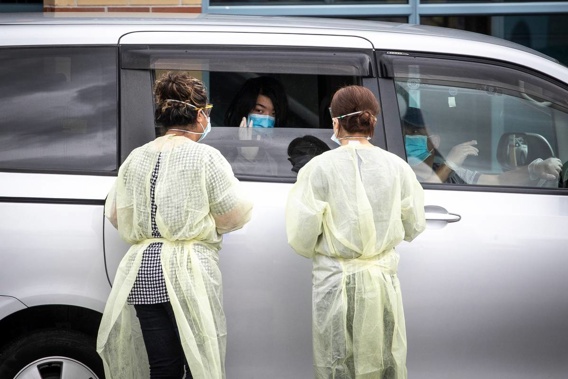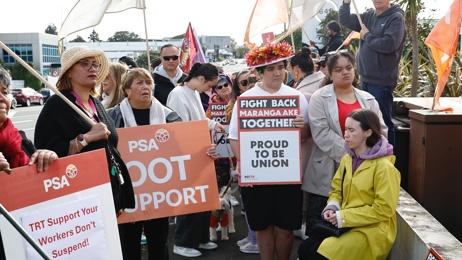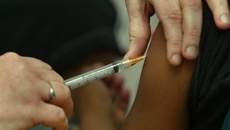
Fourteen thousand people could die if Covid-19 spreads out of control in New Zealand – and potentially as many as 27,600 in another modelled scenario.
That's according to a tranche of new modelling just released by the Government.
A team of Otago University researchers, who provided the modelling to the Ministry of Health, found that uncontrolled spread in the country could see up to 64 per cent of the population infected, 32,000 people hospitalised, and up to 14,400 deaths.
Assuming New Zealand's strategy of elimination failed, the modelling considered the most plausible scenarios that could play out.
It depended on how easily the virus could spread from one person to another, and assumed that general contact between much of the population would be reduced for between six and nine months.
These scenarios involved between 44 per cent and 64 per cent of the population becoming sick; between 22,000 and 32,000 needing to be hospitalised; 5540 to 8000 people needing critical care; 2770 to 4000 requiring ventilators; and 8560 to 14,400 dying.
On the worst day for the worst scenario, there would be 11,200 people needing to be hospitalised and 2800 needing to be admitted to critical care.
"For this scenario, ICU capacity would be full on day 92, at a very early point in the epidemic curve," the report found.
"Such demands are unprecedented in New Zealand's history and unless there was a major reconfiguration of services, would be overwhelming, with a risk of this pushing up the case fatality rate."
The mortality burden would almost certainly be much higher in older age-groups - potentially 89 per cent of the deaths were estimated to be in the 60-plus age-group - and also would probably be patterned by ethnicity, with higher rates for Māori and Pacific peoples, and for people living in deprived areas.
"If New Zealand fails with its current eradication strategy toward Covid-19, then health outcomes for New Zealand could be very severe.
"If interventions were intense enough, however, in some scenarios the epidemic peak could still be suppressed or pushed out to the following year [at which time a vaccine may be available]."
Another set of modelling by the same team, which had a higher level of uncertainty, painted a more dire picture.
That looked at a worst-case scenario where eradication had failed and the epidemic peaked in early July 2020.
A total of 3.32 million New Zealanders would be expected to get symptomatic illness; 146,000 would be sick enough to require hospital admission; 36,600 would be sick enough to require critical care (in an ICU); and 27,600 would be expected to die.
"This death toll would far exceed the death toll for NZ from World War I (18,000 deaths) and from the 1918 influenza pandemic (9000 deaths)," that report said.
"Not considered here also are all the deaths from people who don't receive normal care (eg, for heart attacks) due to re-orientation of the health system to deal with Covid-19."
The researchers said this plausible worst-case analysis still assumed a functioning ICU capacity that saves 25 per cent of those who need ICU care.
"This may still be optimistic as in severe overload situations there may be rate limiting steps such as the supply of ventilators," the researchers said.
"In other worse case scenarios hospital staff could go on strike if shortages of personal protective equipment (PPE) developed – further disrupting care."
Ministry of Health director-general of health Dr Ashley Bloomfield said the modelling showed that, without the actions currently being taken, the uncontrolled spread of Covid-19 "would exact a high price in New Zealand in terms of its impact on our health services, including our intensive care units, and deaths".
"The modelling was continually updated as more real world evidence could be incorporated and the impact of different interventions could be considered," he said.
"What is consistent across all the models is that we had a stark choice – let the virus spread unchecked and see large numbers of New Zealanders get sick, our health system overrun and many people dying, or taking firm measures to save lives.
"All of the scenarios show an unacceptable level of deaths in New Zealand without strong action. We can see these scenarios playing out overseas already.
"Even with the sorts of strong measures we have in place to stamp out the virus the modelling is still predicting there could be a heavy toll on our health system and loss of life.
"That shows how seriously we need to take the virus, stick to the rules of the lockdown and maintain measures that reduce the risk of the virus entering the country."
The modelling was considered alongside a range of other information to inform the Ministry of Health's advice to the Government on its response to the Covid-19 pandemic.
One of the researchers behind the modelling, Otago University public health professor Nick Wilson wanted the ministry to start separating out cases of community transmission from those related to returned overseas travellers, to give a clearer picture of Covid-19 in the community.
• Covid19.govt.nz: The Government's official Covid-19 advisory website
He also wanted New Zealand to ramp up its level of testing and contact tracing, saying that testing should be carried out on anyone turning up at an emergency department with respiratory issues, as well as randomly in the community.
But he said, for now, New Zealand was well placed to stamp out Covid-19 through a strategy of elimination.
"We are in a situation where we really have adopted the best strategy ... very few countries have been able to do that."
Wilson was also involved in other modelling that suggested how countries that didn't have that advantage could try to suppress Covid-19 through sustained lockdowns so that peaks in cases didn't arrive until next year, when a vaccine might become available.
Another set of modelling, by researchers from Te Punaha Matatini, showed that - failing eradication - lockdown measures like those in place now could delay a peak for up to 400 days, but wouldn't prevent it.
Any relaxing of those measures could result in hospitals being overwhelmed with a surge six times that of hospital capacity within a few months.
That capacity would be exceeded at the point that 40,000 people contracted the virus.
Left to spread without any controls, the virus could infect 89 per cent of the population and kill up to 80,000.
The best-case scenario if elimination failed – which still involved keeping New Zealand effectively shut down – death numbers would drop to just about 20 people, and hospital capacity would remain within limits for more than a year.
- Additional reporting, RNZ
Take your Radio, Podcasts and Music with you









